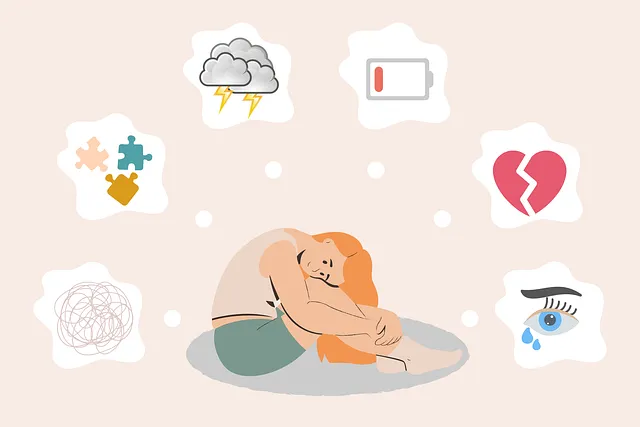The Kaiser Permanente mental health facility in Broomfield leverages the RFM framework—Reach, Frequency, Motivation—to deliver effective, culturally sensitive care that enhances resilience and emotional healing. By integrating diverse self-care practices, holistic programs, and data-driven improvements, they foster a supportive environment for patients from various backgrounds. This approach not only improves outcomes but also encourages public awareness of mental health and policy changes, ultimately building resilient communities ready to face life's challenges.
“Discover how Resilience, Flexibility, and Mastery (RFM) exercises are transforming mental health care at Kaiser Permanente Broomfield. This comprehensive guide explores the significance of RFM in addressing contemporary mental health challenges. Through a detailed case study, we delve into the implementation process at this leading Kaiser Permanente facility, showcasing its impact on patient well-being. Learn effective strategies for incorporating RFM, and understand key metrics for evaluating the success of these innovative programs.”
- Understanding RFM and its Significance in Mental Health Care
- Kaiser Permanente Broomfield: A Case Study on Resilience Building
- Implementing Effective Resilience Exercises
- Measuring Success: Evaluating the Impact of RFM Programs
Understanding RFM and its Significance in Mental Health Care

At Kaiser Permanente mental health facility Broomfield, understanding RFM—Reach, Frequency, and Motivation—is paramount in delivering effective care. This simple yet powerful framework helps professionals assess and strengthen patient engagement with treatment, a key pillar in fostering resilience and accelerating emotional healing processes. By gauging how often individuals engage with services (Frequency), their level of commitment and motivation (Motivation), and the extent to which these services reach them (Reach), mental health practitioners can tailor interventions for maximum impact.
Integrating cultural sensitivity in mental healthcare practice is also vital, ensuring that RFM strategies resonate with diverse patient populations. This involves understanding cultural contexts, beliefs, and barriers to care, thereby enhancing confidence-boosting approaches and improving outcomes. By adopting a nuanced approach that respects individual differences, Kaiser Permanente’s Broomfield facility promotes inclusive care, enabling patients from various backgrounds to embark on their emotional healing journeys successfully.
Kaiser Permanente Broomfield: A Case Study on Resilience Building

Kaiser Permanente Broomfield, a renowned mental health facility, serves as an excellent case study for understanding the impact of resilience-building exercises. This healthcare organization has recognized the significance of fostering resilience among its patients and employees, leading to innovative initiatives that positively influence the community. By integrating various self-care practices, the facility encourages individuals to take an active role in their mental well-being. These practices range from meditation and mindfulness sessions to group therapy activities, providing a holistic approach to building resilience.
The success of Kaiser Permanente’s strategy highlights the potential for public awareness campaigns development and Mental Health Policy Analysis and Advocacy. Their comprehensive program demonstrates that resilience training can be effectively tailored to diverse populations, offering hope and practical tools to navigate life’s challenges. This case study inspires others in the field to prioritize resilience-building as a key component of mental health support, ultimately contributing to more resilient and adaptable communities.
Implementing Effective Resilience Exercises

Implementing effective resilience exercises at Kaiser Permanente mental health facility Broomfield involves a strategic approach tailored to individual needs and preferences. These exercises are designed to empower individuals with coping mechanisms, fostering self-reliance and mental wellness. A balanced program could include a combination of physical activities, mindfulness meditation, and cognitive behavioral techniques. For instance, regular Mindfulness Meditation sessions have been shown to reduce stress and anxiety, enhancing overall mental health.
Self-Care Routine Development for Better Mental Health is another crucial aspect. Encouraging clients to engage in consistent self-care practices, such as regular sleep patterns, balanced nutrition, and designated time for hobbies or relaxation, can significantly contribute to building resilience. These exercises aren’t just about surviving challenges but thriving despite them.
Measuring Success: Evaluating the Impact of RFM Programs

Measuring success is a vital component when implementing RFM (Resilience, Flexibility, and Mindfulness) programs at Kaiser Permanente’s mental health facility in Broomfield. The impact of these initiatives can be evaluated through various means, ensuring that the programs effectively foster resilience among staff and improve overall facility operations. One key metric is tracking employee satisfaction and retention rates; significant improvements in these areas indicate successful RFM implementation.
Additionally, regular assessments of emotional intelligence within the workforce can highlight advancements in crisis intervention capabilities. The Crisis Intervention Guidance (CIG) program, for instance, equips professionals with tools to manage high-stress situations, and measuring emotional intelligence post-training can demonstrate its practical application. This data-driven approach allows for continuous improvement, tailoring Risk Management Planning for Mental Health Professionals to meet the unique needs of the Broomfield facility.
The implementation of RFM (Resilience, Flexibility, and Mastery) exercises in mental health care, as demonstrated by Kaiser Permanente Broomfield’s successful program, offers a promising approach to enhancing patient resilience. By integrating these strategies into treatment plans, mental health facilities like Kaiser Permanente can empower individuals to navigate life’s challenges more effectively. Measuring the impact of RFM programs through rigorous evaluation ensures that these initiatives remain tailored to the unique needs of patients. This case study highlights the potential for widespread adoption of such practices in the field of mental health care, fostering resilience and improving overall well-being among those seeking support at facilities like Kaiser Permanente Broomfield.






